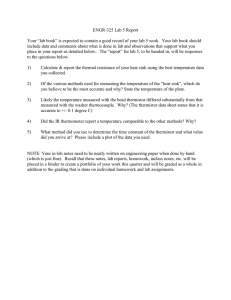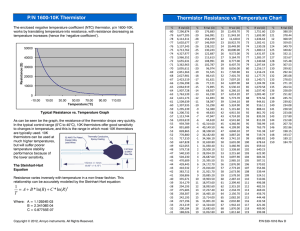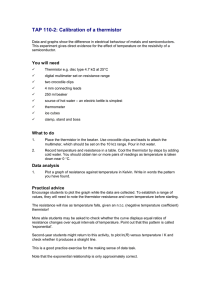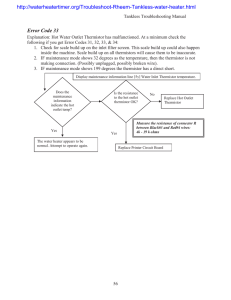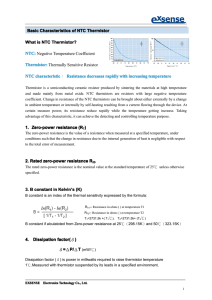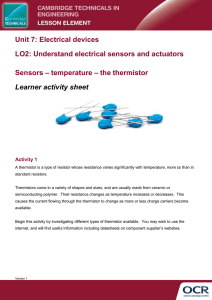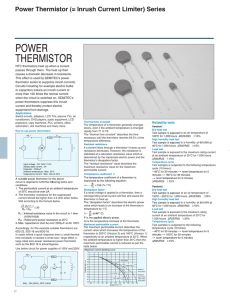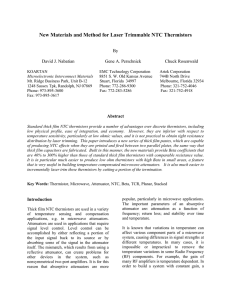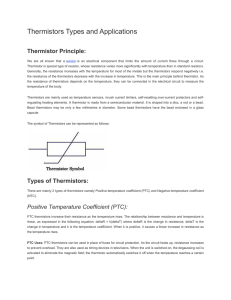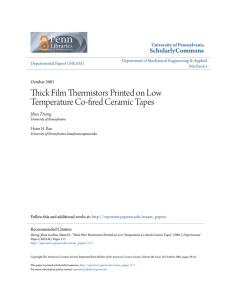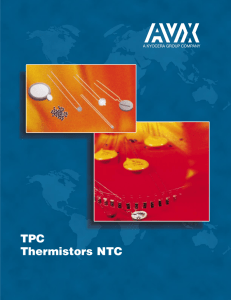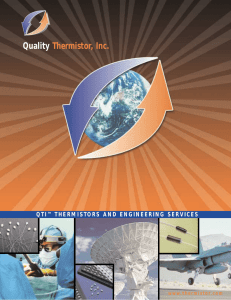(NTC) Thermistors
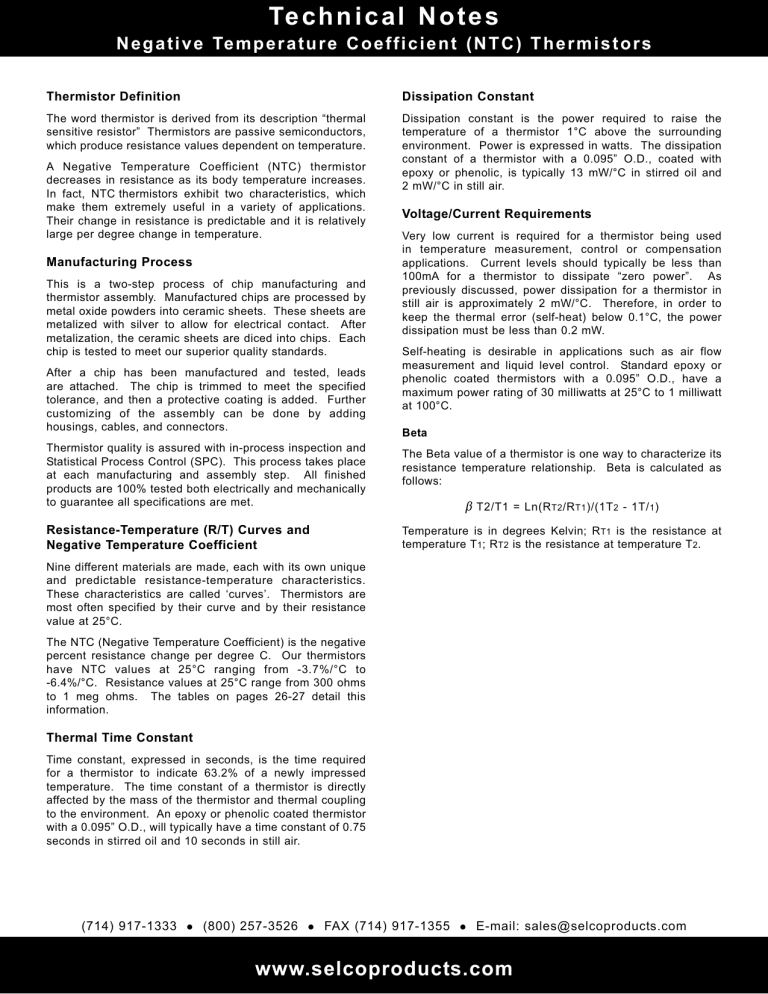
Te c h n i c a l N o t e s
N e g a t i v e Te m p e r a t u r e C o e f f i c i e n t ( N T C ) T h e r m i s t o r s
Thermistor Definition
The word thermistor is derived from its description “thermal sensitive resistor” Thermistors are passive semiconductors, which produce resistance values dependent on temperature.
A Negative Temperature Coefficient (NTC) thermistor decreases in resistance as its body temperature increases.
In fact, NTC thermistors exhibit two characteristics, which make them extremely useful in a variety of applications.
Their change in resistance is predictable and it is relatively large per degree change in temperature.
Manufacturing Process
This is a two-step process of chip manufacturing and thermistor assembly. Manufactured chips are processed by metal oxide powders into ceramic sheets. These sheets are metalized with silver to allow for electrical contact. After metalization, the ceramic sheets are diced into chips. Each chip is tested to meet our superior quality standards.
After a chip has been manufactured and tested, leads are attached. The chip is trimmed to meet the specified tolerance, and then a protective coating is added. Further customizing of the assembly can be done by adding housings, cables, and connectors.
Thermistor quality is assured with in-process inspection and
Statistical Process Control (SPC). This process takes place at each manufacturing and assembly step. All finished products are 100% tested both electrically and mechanically to guarantee all specifications are met.
Resistance-Temperature (R/T) Curves and
Negative Temperature Coefficient
Nine different materials are made, each with its own unique and predictable resistance-temperature characteristics.
These characteristics are called ‘curves’. Thermistors are most often specified by their curve and by their resistance value at 25°C.
The NTC (Negative Temperature Coefficient) is the negative percent resistance change per degree C. Our thermistors have NTC values at 25°C ranging from -3.7%/°C to
-6.4%/°C. Resistance values at 25°C range from 300 ohms to 1 meg ohms. The tables on pages 26-27 detail this information.
Thermal Time Constant
Time constant, expressed in seconds, is the time required for a thermistor to indicate 63.2% of a newly impressed temperature. The time constant of a thermistor is directly affected by the mass of the thermistor and thermal coupling to the environment. An epoxy or phenolic coated thermistor with a 0.095” O.D., will typically have a time constant of 0.75
seconds in stirred oil and 10 seconds in still air.
Dissipation Constant
Dissipation constant is the power required to raise the temperature of a thermistor 1°C above the surrounding environment. Power is expressed in watts. The dissipation constant of a thermistor with a 0.095” O.D., coated with epoxy or phenolic, is typically 13 mW/°C in stirred oil and
2 mW/°C in still air.
Voltage/Current Requirements
Very low current is required for a thermistor being used in temperature measurement, control or compensation applications. Current levels should typically be less than
100mA for a thermistor to dissipate “zero power”. As previously discussed, power dissipation for a thermistor in still air is approximately 2 mW/°C. Therefore, in order to keep the thermal error (self-heat) below 0.1°C, the power dissipation must be less than 0.2 mW.
Self-heating is desirable in applications such as air flow measurement and liquid level control. Standard epoxy or phenolic coated thermistors with a 0.095” O.D., have a maximum power rating of 30 milliwatts at 25°C to 1 milliwatt at 100°C.
Beta
The Beta value of a thermistor is one way to characterize its resistance temperature relationship. Beta is calculated as follows:
$
T2/T1 = Ln(R
T2
/R
T1
)/(1T
2
- 1T/
1
)
Temperature is in degrees Kelvin; R T1 is the resistance at temperature T 1 ; R T2 is the resistance at temperature T 2 .
(714) 917-1333 (800) 257-3526 FAX (714) 917-1355 E-mail: sales@selcoproducts.com
www.selcoproducts.com
Te c h n i c a l N o t e s
N e g a t i v e Te m p e r a t u r e C o e f f i c i e n t ( N T C ) T h e r m i s t o r s
Steinhart-Hart Equation
The Steinhart-Hart Equation is an empirically developed polynomial which best represents the resistance-temperature
Equation is more accurate than previous methods.
Specifically, it is more accurate over wider temperature ranges. To solve temperature when resistance is known, the form of the equation is:
1T=a+b(LnR)+c(LnR) 3
To solve for resistance when temperature is known, the form of the equation is:
R=e(exp)[a /2+( a 2 /4+ a 3 /27) -2 ) -3 +(a /2-( a 2 /4+ a 3 /27) 2 ) 3 ] where alpha = (a-1/T)/c and
$
= b/c
For both forms of the equation T is temperature expressed in degrees Kelvin; a, b, and c can be solved simultaneously using the following:
1/T 1 =a+b(LnR 1 )+c(LnR 1 ) 3
1/T 2 =a+b(LnR 2 )+c(LnR 2 ) 3
1/T3=a+b(LnR 3 )+c(LnR 3 ) 3
The data calculated by these equations will be accurate to better than ±0.01°C when -40°C is less than or equal to
150°C and
|
T1-T2
| is less than or equal to 50°C and
|
T2-T3
| is less than or equal to 50°C and T1, T2, and T3 are evenly spaced.
Maximum Temperature Rating/
Recommended Operating Ranges
Our thermistors may be intermittently cycled at temperatures from -50°C to 150°C. Stability is achieved when the thermistors are stored at temperatures less than 50°C and operated continuously at temperatures less than 100°C. For interchangeable thermistors, optimum stability is achieved when the thermistors are operated at temperatures within the specified temperature range.
Stability
Years of experience in thermistor manufacturing, coupled with stringent process controls, ensures that highly stable thermistors are produced. In fact, our thermistors typically exhibit less than 0.02°C thermometric drift per year when stored or operated at temperatures less than 50°C. The stability of a thermistor is greatly dependent on environmental conditions such as humidity, excessive temperatures and thermal shock. These effects should be minimized to guarantee stability.
(714) 917-1333 (800) 257-3526 FAX (714) 917-1355 E-mail: sales@selcoproducts.com
